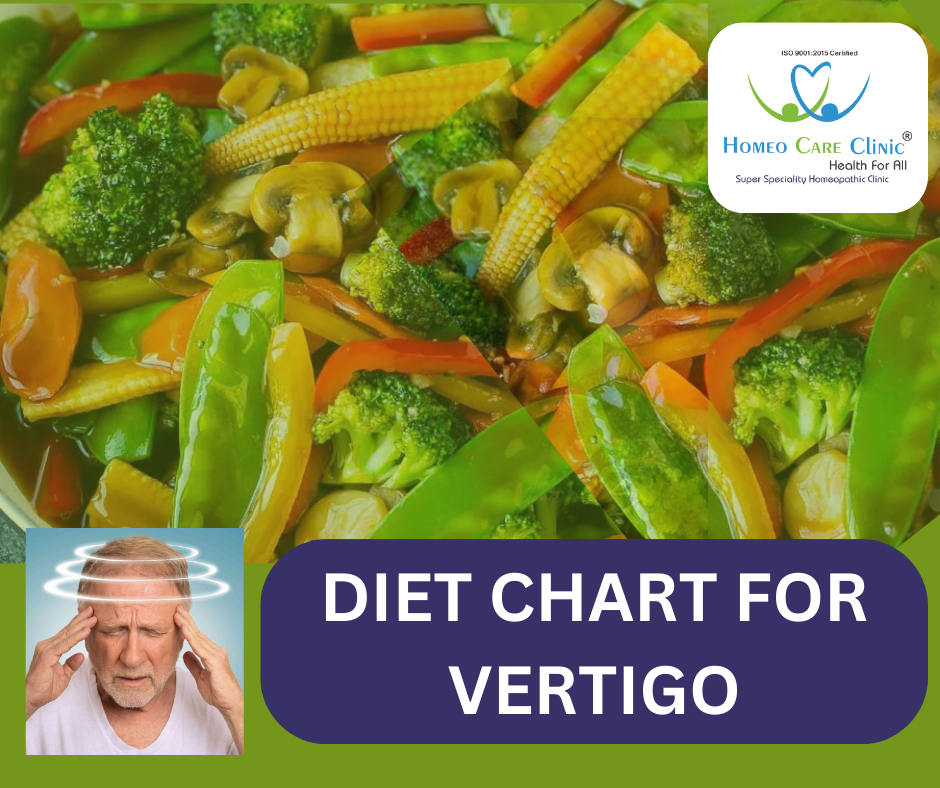Diet Chart For Vertigo

With the appropriate diet, vertigo can be well-managed, stabilizing the nervous system, and not allowing any triggers to surface. Here is a diet chart for vertigo patients, listing foods to include and avoid, offering a balanced mixture of all essential nutrients for inner ear health:
Vertigo Diet Chart
| Time | Vegetarian Option | Non-Vegetarian Option |
|---|---|---|
| 6:30 AM (Morning Drink) | Warm water with a pinch of ginger or lemon (1 glass) | Warm water with lemon or turmeric (1 glass) |
| 7:30 AM (Breakfast) |
|
|
| 10:30 AM (Snack) | A handful of almonds and walnuts or 1 apple | Grilled chicken breast slices with cucumber |
| 1:00 PM (Lunch) |
|
|
| 4:00 PM (Snack) | Roasted fox nuts (makhana) or fresh fruit like guava or papaya | Greek yogurt with seeds or grilled chicken (50g) |
| 6:30 PM (Evening Drink) | Herbal tea with ginger or peppermint (1 cup) | Coconut water (1 glass) |
| 8:00 PM (Dinner) |
|
|
| 8:30 PM (Before Bed) | Warm milk with turmeric (1 cup) | Warm milk with cinnamon (1 cup) |
Do’s:
Good Foods for Vertigo
- Ginger: This particular spice is known for its anti-nausea properties. It’s going to reduce the feeling of dizziness and nausea when you have vertigo. Add ginger to teas, curries, and soups.
- Leafy Greens: Spinach, kale, and broccoli are rich in vitamins that help improve blood circulation, ensuring proper functions in the nervous system.
- Vitamin C-Rich Food: All citrus fruits like oranges, lemons, guava, and bell peppers keep your immune function in order, which balances the body’s equilibrium and reduces the episodes of vertigo.
- Magnesium-rich foods Nuts (almonds, cashews), seeds, avocados, and dark leafy veggies usually hold a lot of magnesium to work on the inner ear and maybe thus avert dizziness.
- Hydrating Foods: Since coconut water, cucumbers, and other water-dense fruits, like watermelon, strawberries maintain proper hydration and possibly prevent episodes of vertigo.
- Whole Grains: Brown rice, quinoa, and oats help maintain energy levels and prevent fluctuations in blood sugar levels which causes dizziness.
Don’ts:
Foods to Avoid in Vertigo
- High-Sodium Foods: Fluid retention due to salt can cause pressure in the inner ear, thus worsening the symptoms of vertigo. So, avoid salty snacks, pickles, or even processed foods.
- Caffeinated Drinks: Caffeinated coffee, tea, and energy drinks worsen the symptoms of vertigo as they interfere with coordination and produce dehydration.
- Alcohol: Alcohol plays around with the balance, the inner ear, and the equilibrium system. It is among the commonly identified triggers of vertigo. Alcohol should be avoided, and it should be minimized.
- Food with High Sugar Levels: Food with too much sugar such as candies, sweets, and fizzy drinks causes fluctuations in the blood sugar level, which may make a vertigo condition worse during an attack.
- Dairy Products: Some persons with vertigo may find that dairy products, especially full-fat products like cheese, butter, and cream, trigger symptoms. Try low-fat or plant-based alternatives instead.
- Processed and Fried Foods: Such foods can cause digestive slowness, and inflammation, and increase the chance of triggering additional vertigo attacks.
Additional Tips:
- Breakfast: Attempt to maintain high-fiber foods such as oat meals or whole grains combined with fresh fruits and a protein source, either nuts or eggs.
- Lunch: Whole grains such as brown rice or quinoa mixed with leafy greens and lean proteins such as paneer, tofu, or fish to make the energy level smooth.
- Dinner: Have a light dinner with vegetable-based soup or stir-fry. More importantly, do not overfeed the system when you are in this phase, especially during dinner.
- Snacks: Hydrating and Magnesium-giving Snacks such as coconut water, nuts, guava, papaya, and apples. Conclusion
More importantly, in the case of vertigo patients, a balanced diet for vertigo patients is one of the ways to manage vertigo. Nutrition that includes hydrating food products would be necessary; therefore, there is a need to have adequate nervous system function and blood circulation. There goes about the avoidance of some other triggers which include caffeine, alcohol, and foods of high sodium. These help reduce attacks and their severity.
In conclusion, Homeo Care Clinic offers a holistic approach to treating the disease. The remedies mentioned above can treat the underlying causes of the condition and offer relief from the discomfort. However, it is important to consult a qualified homeopathic practitioner for the correct dosage and duration of treatment. Homeo Care Clinic provides comprehensive care for various ailments and offers customized treatment plans based on individual requirements.
To schedule an appointment or learn more about our treatment, please visit our website or give us a call +91 9595211594 Our friendly staff will be happy to assist you. If you’re searching for the best homeopathy doctor, we are here to help.
Follow us on Facebook, Twitter, and Instagram for valuable insights into the world of homeopathy and holistic health.
Facebook – https://www.facebook.com/homeocareclinicpune
Instagram – https://www.instagram.com/homeocareclinic_in
Website – https://www.homeocareclinic.in
Chat with the best homeopathic doctor privately
If you have any queries regarding your disease or any symptoms, Click to send a WhatsApp message. Our best homeopathy doctor will be happy to answer you.
Book an Appointment
If you want to visit our clinic, Click to book an appointment.
Online treatment
If you are a busy professional, or you are living in a remote town or city, with no best homeopathic doctor near you, Clickhere to start an online homeopathic treatment with the world’s exclusive, most experienced, and best homeopathic clinic, managed by Dr. Vaseem Choudhary world-renowned homeopathic doctor expert.





